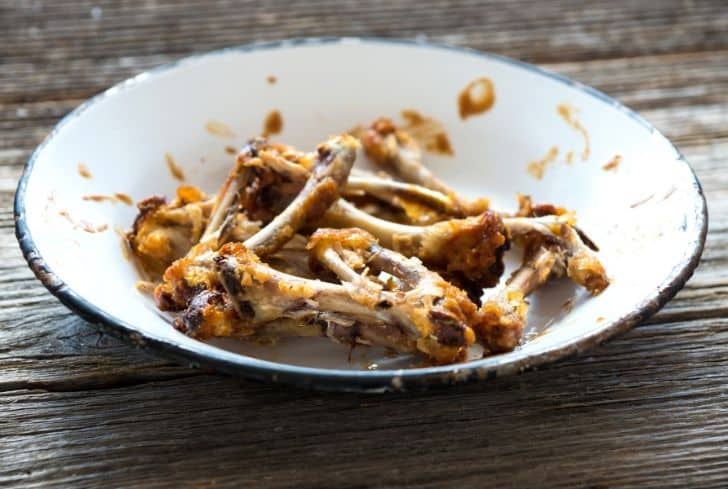“Which came first: the chicken or the egg?” This century-old paradox continues to plague young people the world over, seeing that all chickens hatch from eggs and all chicken’s eggs are laid by chickens. Well, paradox aside, chicken is one of the world’s most famous dish, enjoyed baked, grilled barbecued, boiled or fried.
After enjoying your chicken, what do you do with the bones? Some use them as a delicious foundation for soups, broth and sauces while others simply throw them away. They are a waste product of the chicken and cannot contribute more to the human body. However, can they contribute to human life in areas such as the garden? This article goes through composting chicken bones.
Are Chicken Bones Compostable?
Indeed, chicken bones are compostable. It is perfectly safe to compost chicken bones, whether cooked or uncooked. Actually, cooked chicken bones are better to compost to deter the spread of harmful bacteria.
The best thing about composting chicken bones is that they are relatively slim, so they naturally decompose quicker than other types of bones. Bones are calcium phosphate and collagen fibers, meaning they can help add calcium to the garden and the plants.
Unfortunately, chicken bones need more time to break down so you should not compost them in haste. You may want to burn them first to quicken the process of breaking them down. So it can work together with the rest of the organic materials you decompose together.
Chicken bones can be composted together with your other fruit and vegetable wastes, although it is not recommended. This is because meat products attract pests and more seriously, they can harbor pathogens like E. coli bacteria if the composting bin does not get hot enough.
This also means bones can take quite some time before they fully decompose. If you are determined to compost chicken bones, try a Bokashi bucket. Bokashi composting uses a special inoculated bran to ferment your food waste and will allow you to compost most types of food waste, including bones, meat and so on.
Alternatively, bury the chicken bones in the middle of the traditional composting pile, where it is the hottest. In there, they will decompose faster, release fewer odors and of course not attract pests.
You can also choose to compost chicken bones inside a hot compost bin. They fully break down in a few months. You can also consider altering your compost ingredients to lean towards more acidic conditions, which speeds up the decomposition process.
However, be careful because acidic compost will affect the microorganisms that work on the decomposition, slowing down the entire process. To encourage faster breakdown, regardless of the composting method, cut or break the bones into smaller pieces as you would vegetables or other scraps.
This ensures the bones decompose quite quickly, makes it easy to turn the composting bin and makes it easy to put them at the center of the compost where it is the hottest.
How Long Do Chicken Bones Take to Compost?
How long it really takes for chicken bones to completely decompose is dependent on several factors. Understand that bones are calcium phosphate and collagen fibers, and the bacteria and fungus that grow inside a compost bin will eat away at the collagen proteins, while acids help break up the calcium phosphate, so the bones begin to disintegrate.
The process of composting as well as how you prepare the bones for the process determines how long it will take, be it months or years. First, if you bury them in the ground, they will take several years, depending on the soil and weather conditions for the bones to disintegrate.
Secondly, if you use hot compost, the heat generated will break the bones quite easily and quickly.
Thirdly, if added to a cold compost, the composting process will take a bit longer than if they were in the hot compost.
However, be sure to cut them into small pieces, place them at the center of the pile here it is the hottest and regularly turn the pile. This ensures the process goes on quickly and does not invite pests who might enter the composting bin and have their way with edibles in the bin.
You can also choose to burn the bones before composting them. Placing them on top of burning wood allows the fat to drip out and feed the fire.
Once they are burnt until they look charred, let them cool and crush them into smaller chunks with your hands or a hammer, and dispose of them into the compost bin where they will decompose with ease. Regardless, if handled well the chicken bones can take about 2 months to fully compost.
Are Chicken Bones Biodegradable?
Yes. Just about anything animal or vegetable is biodegradable, and yes, this includes chicken bones. Anything that can be composted, is biodegradable since it is organic. Chicken bones are compostable and will degrade whether in the compost or landfills.
The bones can take a lot longer for them to break down in comparison to softer food, but they eventually do. The simplest and quickest way to compost them is in a Bokashi bin or a hot compost, where they can disintegrate in about two months or more.
If placed in cold compost, the process will take quite longer. Fresh chicken bones contain approximately 80% moisture, 12% carbon and 2.4% nitrogen, and have a C:N ratio of 5:1 by weight.
They, therefore, contribute more carbon to the compost and soil, along with other healthy nutrients. However, the bones by themselves are deficient in enough carbon and too wet to compost, so additional carbon material or substrate must be added to the mix.
Are Chicken Bones Good For the Soil?
Oh yes! Chicken bones are good for the soil and make good fertilizer for your garden. It is a process that can take some time but the entire process is healthy for the soil. To make the perfect fertilizer using chicken bones, collect as many as you can and break them into smaller pieces, especially if they are big ones.
Next, put the bones in a pot, cover them with water, and boil them for at least 15 minutes, longer if necessary, so that you can easily remove meat or fat that is still attached to them. Others prefer to burn the bones to release the fats and have the bones by themselves, before crushing them.
Next, let the bones dry in the sun for a few days but beware of dogs and other animals that might come for them. After they are dry, crush them or pound them into a fine powder.
The powdered bones can be used directly on the soil as fertilizer or can be added to the compost, where it will compost quite quickly. Chicken bone fertilizer is full of essential phosphorous, potassium, nitrogen and calcium, and plant foods like vegetables do very well in said fertilizer.
As the bone meal fertilizer breaks down over the season, it will steadily and slowly release these nutrients for plant uptake. The advantageous aspects of slow-release nutrition are that plant roots will not burn, and that soil vitality is increased for extended periods.
If you decide to use it directly in the garden, just sprinkle the homemade fertilizer in the bottom of the planting furrow before putting in the seeds. The bone meal fertilizer can be stored in a dry place until the next season.
What is more, is that the fertilizer is inexpensive to make and does not contain the dangerous chemicals doled out by other chemically processed fertilizers.
Can You Put Chicken Bones in the Garden?
Yes, you can put chicken bones in the garden, but the form in which the bones are determines if it is a good decision. There are three major ways of adding chicken bones to the garden, two of which are beneficial and work best for the soil.
First, you can decide to add the bones as they are, directly to the garden. The unfortunate thing with this route is that it can take months and even years before fully decomposing, a process that might not be the best for the garden.
Secondly, was the basis of this article, and is composting. Composted chicken bones are fully decomposed and release the essential nutrients to the garden through the compost. It should include other organic materials and is therefore rich in vital nutrients, beneficial to both the soil and the plants.
Thirdly, you can make chicken bone meal fertilizer, which is also okay for the garden. To make the fertilizer, burn or boil the bones first. If boiled, let them dry in the sun and then crush them. If burned, let them release all the fats, cool and then crush them.
Either way, the bones crushed into a fine powder, will be sprinkled on the garden, a healthy way to add nitrogen, phosphorous and calcium into the soil and plants. The fine powder can also be added to the compost, and come up with a compost that is vital for the garden. If composting is not your way, you can keep the fertilizer in a dry place until the next season.
Can You Put Chicken Bones in a Garbage Disposal?
Well, strictly No! chicken bones should not be added to the garbage disposal at all costs. The garbage disposal has sharp blades that can do a lot of damage to a lot of food scraps.
The bones can dull the blades, just the same way they would a knife. It makes it much more difficult for you to toss anything else inside the device and will require the assistance of a professional to have the blades replaced or sharpened, another expense that can be avoided.
Another risk with putting the bones inside the garbage disposal is that they can snap the blades, as they are denser than other kitchen wastes like fruits or vegetables. It is like throwing a rock from the garden inside the drain and hoping for the best.
Bones can do irreparable damage to the blades and the machine in general, forcing you to require the services of a professional, which will cost you.
Bones should never be jammed down the garbage disposal as they can clog it or result in other complications that will present themselves soon. One of these complications is awful smells coming from the pieces of rotting meat stuck in the garbage disposal.
These smells will make your kitchen inhabitable, not forgetting to invite pests like biting flies and rats to your kitchen. If you have waste bones, place them in the regular garbage where the city will take care of the garbage.
However, be careful about the reaching dogs, rats and raccoons that might come for them. The more eco-friendlier options include making fertilizer from the bones or composting them, before adding them to your garden.






